Do you grow a lot of basil and are wondering what the best basil companion plants are for your garden? Here’s what you should plant with basil- and what should be kept away!
Basil is an easy to grow herb that is a staple in many backyard vegetable and herb gardens.
This site contains affiliate links. If you make a purchase using one of these links, I may earn a commission. Please see my disclosure page for more information about cookies collected and our privacy policy.
It has a sweet, fragrant, and somewhat peppery flavor that is perfect for adding flavor to sauces, salads, and soups.
But basil shouldn’t just be relegated to the herb garden- it deserves a prominent place in your vegetable garden as well.
Basil is the perfect companion plant for many other fruits, veggies, and herbs!
Not growing basil in your garden yet? You should be! Here’s how: How to Grow Basil.
What is Companion Planting?
Companion planting is a gardening wisdom that has says that when certain plants are grown together, you can get increased yields, better flavor, less disease and fewer pests.
It’s also a way of planting your garden that pairs plants together for a mutual benefit such as space, shade, pest control or nutrients.
For example, let’s say you are talking about tomatoes. Maybe you have trouble with aphids or spider mites on your plants each year. This is your host plant.
You would choose a companion plant (or 2) that helps deter these pests away from your tomatoes. You can also choose a companion plant that helps improve the flavor of your tomatoes too.
What are the Benefits of Companion Planting?
Companion planting isn’t just about pest control, it has lots of other benefits as well. Here are just a few of the benefits of using companion planting in your garden:
Attract Beneficial Insects: Including predatory insects and parasitic wasps that will feed on garden pests such as squash bugs, aphids, hornworms, and more. As well as pollinators such as bees. Basil is a great companion plant for this purpose!
Learn more about 9 Beneficial Insects you want in your garden and how to attract them.
Changes in the Soil: Different plants can either add or take away elements of the soil. Legumes are nitrogen fixing and help make nitrogen more readily available for heavy feeders.
Root vegetables can help break up the soil and plants with longer roots can draw more nutrients up for crops with shallow roots.
Help Control Insects: Companion planting can help control pests in your garden by repelling them or as a trap crop to collect pests.
Provide Ground Cover: Low growing plants help provide a living mulch and suppress weeds around the host plant. They can also prevent erosion.
Save Space and Time: When you plant crops that don’t compete for nutrients you can place them closer together without overworking the soil.
This also works with similar crops, like peppers and tomatoes, which have the same sun, soil nutrient, and care requirements. Planting them together will allow you to prepare the beds and care for them efficiently.
The Best Basil Companion Plants for Your Garden
Tomatoes: Tomatoes are one of the best basil companion plants. If you could only grow one companion plant with your tomatoes, basil should be it. Basil Improves growth and flavor of your tomatoes. (No wonder they go so well together in recipes too!)
Basil also offers the added benefit of repelling insect pest such as spider mites and aphids and it will attract pollinators, ensuring a better harvest.
Asparagus: I love planting basil throughout my garden. Not only does it give a great harvest itself, but it also has pest control properties. Basil can help keep aphids and asparagus beetle off of your asparagus.
Basil plants also helps attract beneficial insects and pollinators.
Peppers: Basil plants are excellent companions to many night shades. It is said to boost the flavor of your peppers.
Basil will also help repel some insect pests that are bothersome to peppers such as aphids, spider mites, and thrips.
Potatoes: Potatoes are another great basil companion plant. Planting herbs such as basil will improve the flavor of your potatoes. Basil can also help deter the potato beetle.
Basil will also attract beneficial insects to your garden to help with pest control and pollination.
Okra: Basil can help keep aphids and flea beetles off of your okra.
Other Herbs: Basil is a great companion plant for many other herbs. Many flowering herbs share the same soil, light, and watering needs making them perfect to pair together.
Herbs that pair well with basil include: marjoram, chamomile, chives, oregano, borage, calendula, and cilantro.
Growing herbs near each other can also provide mutual benefits in terms of pest control and drawing beneficial insects to your garden.
Beets: Beet greens can be a great trap crop for pest that trouble basil. Basil can help deter soil boring insects that go after the beets.
Turnips: Like beets, the greens make a great trap crop for basil pests. And the basil’s scent can help deter turnip pests and predators.
What NOT to Plant With Basil
Not all plants grow well together. Here are 5 plants that do NOT make good basil companion plants:
Fennel: Fennel will inhibit the growth of your basil plants. Fennel stunt the growth of many plants, so it’s not a great companion in general and should be kept in its own spot in the garden.
Cucumber: Don’t plant aromatic herbs like basil around your cucumber plants or the flavor of your cucumbers might be affected. Since cucumbers contain a lot of water they can sometimes take on the taste of the plants planted close by.
Sage: While sage and basil won’t hurt each other, they have very different growing requirements. Sage prefers dry, sandy soil, while basil needs a lot more moisture and nutrients.
Rue: Rue can inhibit the growth of basil and should not be planted along side basil.
Rosemary: Like sage, rosemary and basil have different growing needs. Rosemary likes much drier conditions, while basil needs more water.
Once you have harvested your basil, check out some of the following articles to learn how to store, use, and preserve your harvest!
Basil is easily preserved by drying- and just a couple plants can give you a year’s worth of dried basil! Here’s how to dry basil at home.
Or you can freeze it- learn How to Freeze Basil here.
Don’t want to dry your basil? Check out these 10 Ways to Preserve Basil
Basil can also be frozen in oil or made into pesto and then frozen. We love making pesto dinner rolls with our pesto!
Want to learn more about companion planting? Learn more here: The Complete Guide to Companion Planting

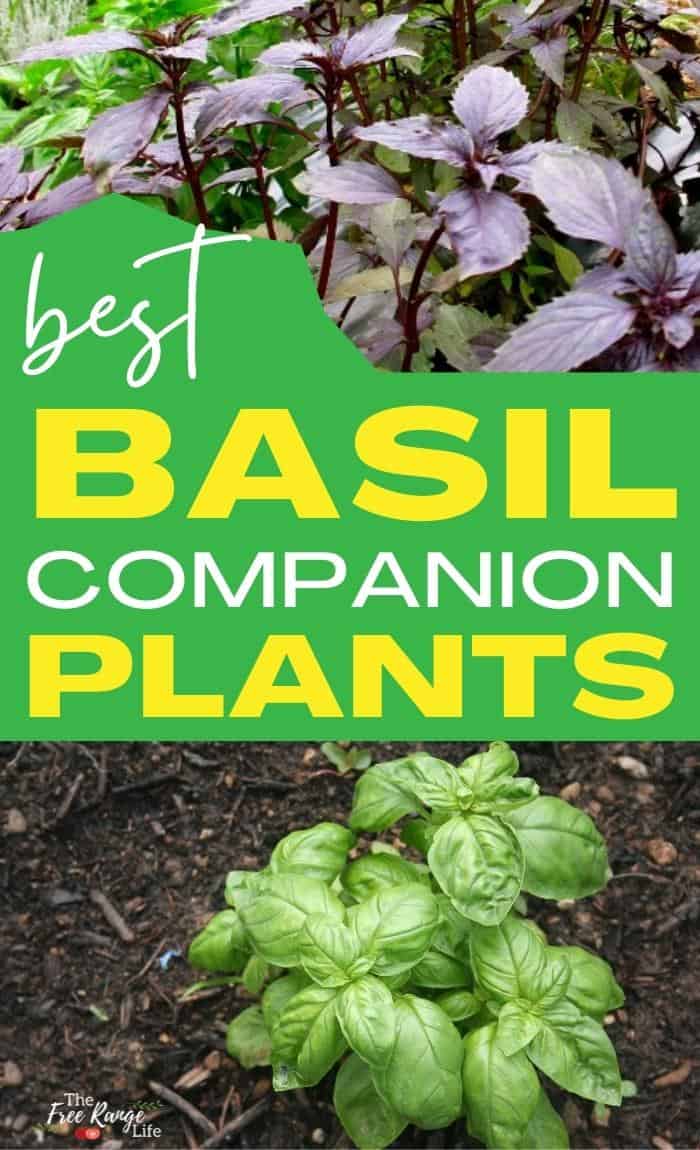
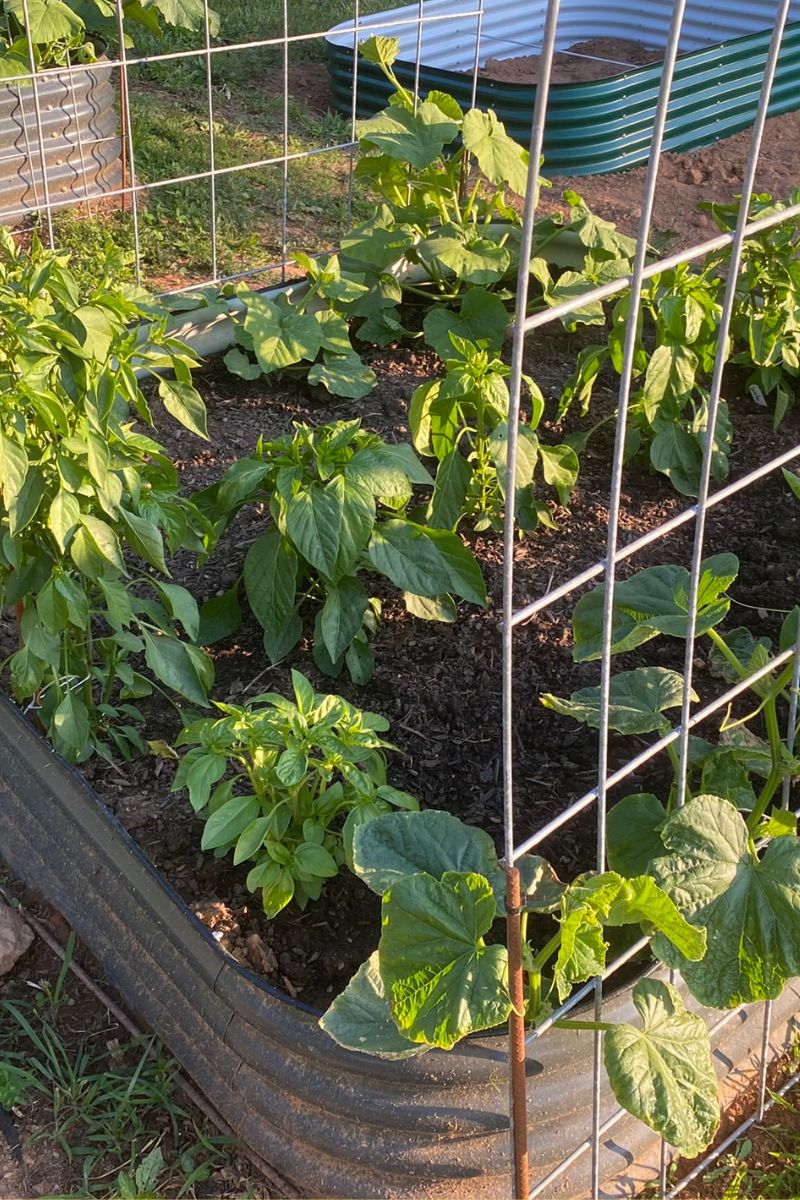
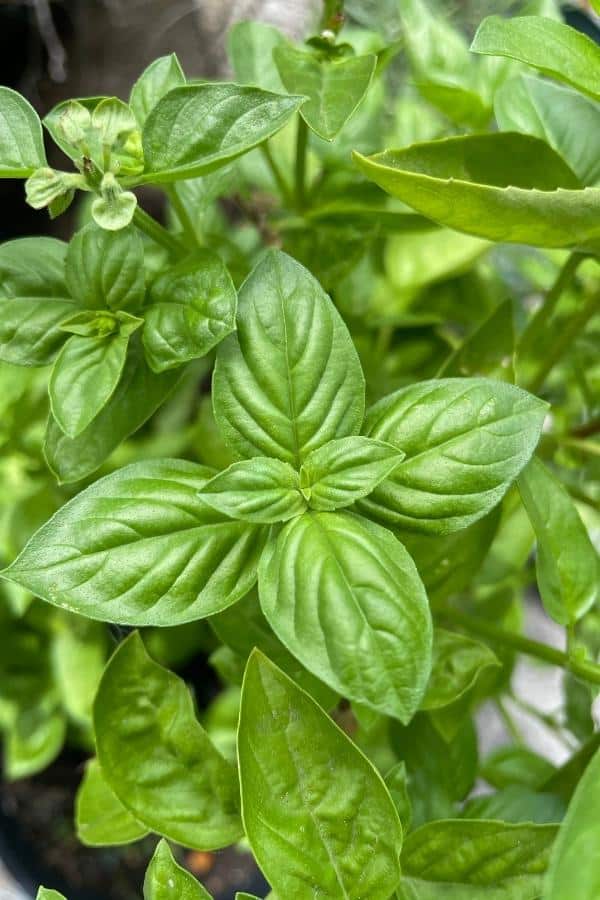
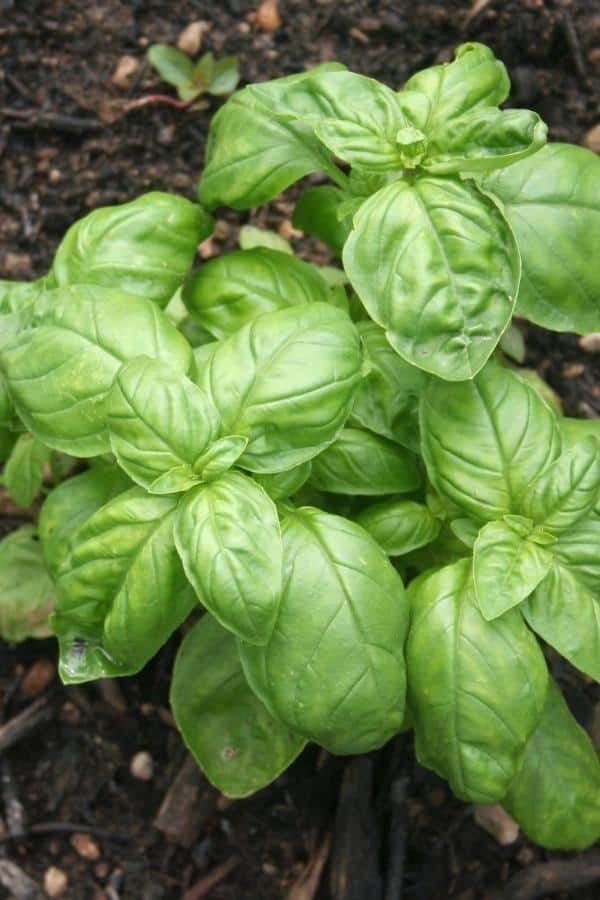

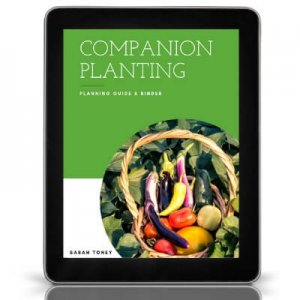
Thank you for providing much needed information about Companion Planting. Although I’m 66 years old, I’m a beginner gardener. Go figure